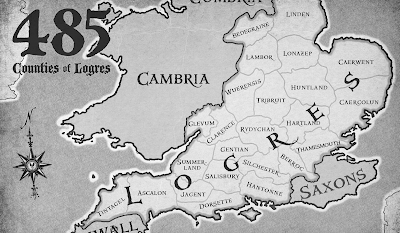Once There Was a Spot
 About two weeks ago, I asked readers to comment on roleplaying games they'd never played but wished they had. The responses were quite interesting and I'd like to thank everyone who took the time to comment on the post. Reading through them, one of the RPGs that was among the most commonly mentioned was Chaosium's Pendragon. Seeing the name of Greg Stafford's masterpiece mentioned so often warmed my heart. I'm incredibly fond of the game and am currently a player in a Pendragon campaign that's been running for more than a year now. However, I must admit that I often wonder how well known the game is outside of the circles in which I move. I'm generally of the opinion that Pendragon deserves to be better known, since it's one of a handful of roleplaying games I'd judge to be "perfect."
About two weeks ago, I asked readers to comment on roleplaying games they'd never played but wished they had. The responses were quite interesting and I'd like to thank everyone who took the time to comment on the post. Reading through them, one of the RPGs that was among the most commonly mentioned was Chaosium's Pendragon. Seeing the name of Greg Stafford's masterpiece mentioned so often warmed my heart. I'm incredibly fond of the game and am currently a player in a Pendragon campaign that's been running for more than a year now. However, I must admit that I often wonder how well known the game is outside of the circles in which I move. I'm generally of the opinion that Pendragon deserves to be better known, since it's one of a handful of roleplaying games I'd judge to be "perfect."I'm not being hyperbolic when I call Pendragon perfect. I have a couple of good reasons to think this, reasons that have the benefit of having been repeatedly put to the test in multiple campaigns I've refereed or played in over the decades since the games original release in 1985. The first is straightforward: its rules are simple yet evocative. More than that, they actively encourage players to get into the mindset of Arthurian legendary characters – and do so without the necessity of having to engage in amateur thespianism. The personality traits and passions system really does make it easier for players to get into their characters' heads in a way that leads to play reminiscent of what you read in Malory.
The second – and more substantial – reason I call Pendragon perfect is its built-in campaign structure. I've been harping on the joys of long campaigns since I returned to this blog almost two years ago. In discussing this matter with others, a common objection is that it's "too hard" to keep a campaign going for years on end, for both creative and logistical reasons. While I don't believe this is true (obviously), I do understand why someone who hadn't successfully been involved in a long campaign might think it was. That's the beauty of Pendragon: the game already does a lot of the heavy lifting for you. The rulebook provides a complete outline of decades of in-game events, from the end of Uther's reign to the fall of the death of Arthur. This is more than enough scaffolding for even a novice referee to build a sprawling, multi-generational campaign that would take, literally, years to complete, especially if you include the additional detail of supplements like The Boy King.
Pendragon assumes that player knights will undertake only a single significant adventure during the course of a year. The game's use of "adventure" is similar to that used by Malory in Le Morte d'Arthur, meaning a major event or confrontation. When combined with the timeline of Arthur's reign the game outlines, the referee is easily able to set events in motion, with the characters providing additional momentum through their own actions, choices, and alliances. As the knights marry, have children, assume greater responsibilities, and eventually die, there's plenty of scope for all manner of drama and intrigue. After a few game years, a Pendragon campaign practically runs itself, making it an ideal vehicle for referees with little experience of long campaigns.
As I said, I'm currently playing in a Pendragon campaign and having a great deal of fun. My first knight. Sir Adtherp, is nearly 40 years old now, having served first the Earl of Salisbury and then Arthur for close to two decades. He has several sons but none are yet old enough to replace him, so I expect, barring an unexpected turn of events, I'll be playing him for several more game years at least. On the other hand, if events should claim Adtherp's life, he has brothers whom I could play until Adtherp's sons come of age, or else I could create a new character entirely. Things are always happening in the campaign, which is humming along quite nicely, thanks in no small part to the remarkable design of the game itself, which is why I never cease to sing Pendragon's praises.
Published on April 21, 2022 09:41
No comments have been added yet.
James Maliszewski's Blog
- James Maliszewski's profile
- 3 followers
James Maliszewski isn't a Goodreads Author
(yet),
but they
do have a blog,
so here are some recent posts imported from
their feed.



